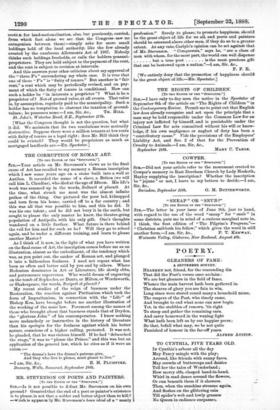THE CORRUPTION OF ROMAN ART.
[TO THE EDITOR or TER "SPECTATOR."] SIR,—Your article on Mr. Stevenson's views as to the final cause of Art has recalled to my memory a Roman inscription which I saw some years ago on a stone built into a wall at Antibes. It recorded the name of a slave, a Briton (we will call him L. Claudius), who died at the age of fifteen. His life's work was summed up in the words, Saltavit et placuit. At the time, what struck me most was the almost infinite pathos of the thing. One pictured the poor lad, kidnapped and torn from his home, carried off to a far country ; and this was all that was possible to him, and this he did. It was his one talent ; and he did not bury it in the earth, but sought to please the only master he knew, the theatre-going population of Antipolis, with his only gift. One's thoughts wandered on a little further. What future is there behind the veil for him and for such as he P Will they go to school again, and be under a different training, and learn to please another Master P As I think of it now, in the light of what you have written on the final cause of Art, the inscription comes before me as an illustration, almost as the embodiment, of the tendency which was, as you point out, the canker of Roman art, and plunged it into a, fathomless foulness. I need not repeat what has been so often and better said by you and by others. Where Hedonism dominates in Art or Literature, life slowly ebbs, and putrescence supervenes. Who would dream of engraving on the tomb of Sophocles, or Dante, or Milton, or Wordsworth, or Shakespeare, the words, Scripsit et placuit My recent studies of the reign of baseness under the Restoration, the reaction against Puritanism which took the form of Impuritanism, in connection with the " Life" of Bishop Ken, have brought before me another illustration of the working of the same law. Foremost among the names of those who brought about that baseness stands that of Dryden, the " glorious John " of his contemporaries. I know nothing more melancholy or instructive in the history of literature than his apologia for the foulness against which his better nature, conscious of a higher calling, protested. It was not, he pleaded, that he was vicious himself. If he had "debauched the stage," it was to "please the Prince," and this was but an application of the general law, which he cites as if it were an axiom :— " The drama's laws the drama's patrons give, And they who live to please, must please to live."


































 Previous page
Previous page